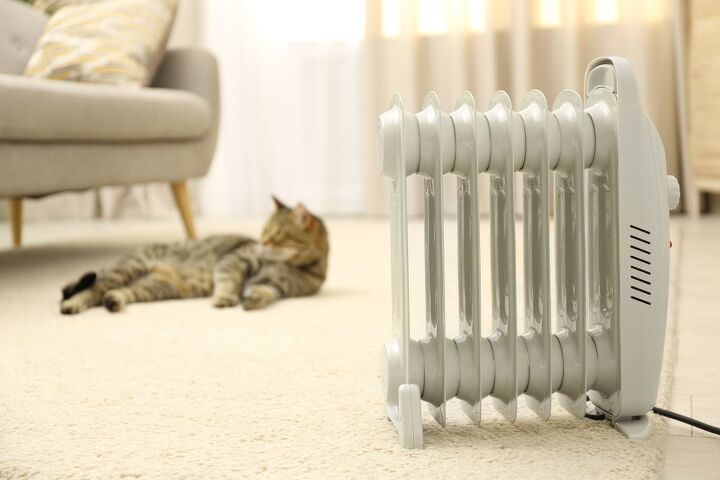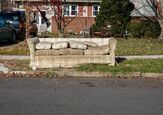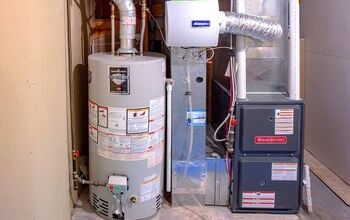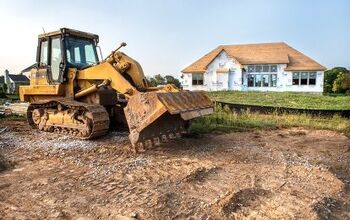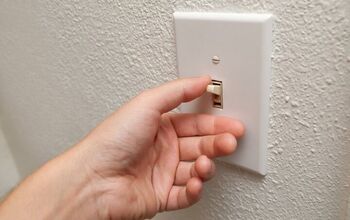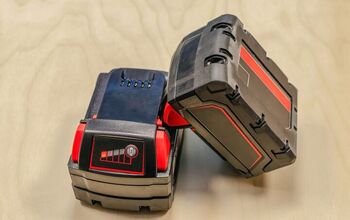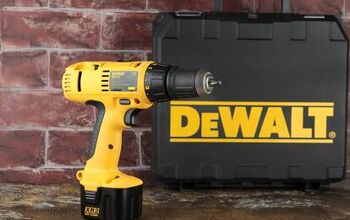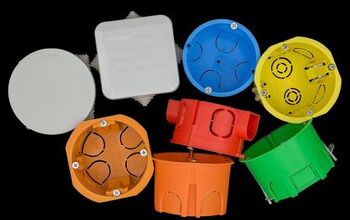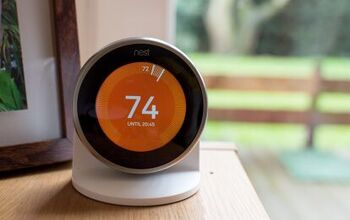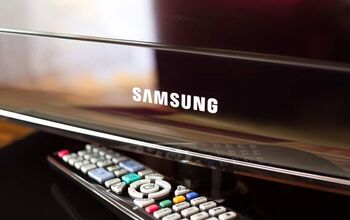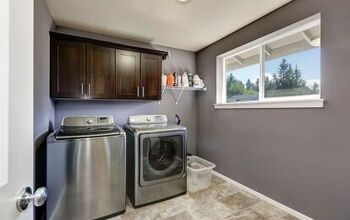Space Heater Keeps Shutting Off? (Possible Causes & Fixes)

Electric and gas space heaters, which utilize electricity or specialized fuel sources such as kerosene or wood pellets to heat bigger enclosed spaces at a more energy-efficient rate, have evolved throughout the decades. This is due to study and devotion to the development of new ways of space heating. Unfortunately, however, things can still go very wrong.
Sometimes space heaters randomly shut off, and this can be due to a variety of issues. The power supply can be cut off, your fuse may be blown, or your thermocouple could be giving out. There are several other issues that could be wrong as well that we’ll go through below.
In this article, we’ll talk about some of the reasons that your space heater may be shutting off. That way, you know what to look for, and we’ll provide steps for you to take in order to fix the problem. Let’s get to it!
Do You Need a Heating and Cooling Contractor?
Get free, zero-commitment quotes from pro contractors near you.

7 Reasons For Space Heater Shut-off
Now, before you decide to take on this problem head-on and tackle it with some much-needed zeal, you must first comprehend the many reasons why your heater keeps turning off on its own.
1. Check Your Power Supply
One of the underlying reasons for an unresponsive space heater is a defective or insufficient power source. Unfortunately, the majority of the time, power sources are neglected in favor of internal heater issues. However, sometimes it’s only a matter of a broken or defective power socket and in desperate need of repair.
The average space heater requires up to 1500 Watts (W) or 1.5 kW (kilowatts) to run and create heat at maximum efficiency. In some cases, the space heater’s voltage (V) and wattage (W) are incompatible with the electrical socket into which it is plugged.
Burnt Or Faulty Cables
In other situations, the socket has most certainly been damaged — look for charring or brownish ‘stains’ around the prong-shaped outputs of the socket. If you see any discoloration, disconnect your space heater right away and see a professional electrician.
A faulty electrical cable is harmful because it can provide a shock to anyone who comes into contact with it by mistake. Typically, this occurs when a dog or little child, out of curiosity, wraps their fingers around an exposed electrical line or brushes their paws against one.
2. Blown Fuse
Thermal fuses are tucked safely inside the limits of most contemporary space heaters’ strong plastic casings. A thermal fuse is a small device that prevents the heater from overheating by blowing out or melting to prevent the remainder of the heater’s components from overheating.
It’s possible that a blown a fuse will cause the space heater to turn off. When a space heater malfunctions in any way, the thermal fuse inside the heater is generally the first line of defense to save the equipment from completely failing.
Fix The Fuse
Suppose you think your heater has a blown thermal fuse. In that case, you’ll need to disassemble it with the right tools, such as adjustable pliers and screwdrivers with various heads. You will use these tools to remove and detach any clips, fasteners, or screws that keep the exterior and inner components of your heater together.
After you’ve completed the disassembly, look for the thermal fuse and see whether it’s burnt, melted, damaged, or broken. A blown fuse must be replaced with a new fuse that meets the exact requirements as its predecessor.
3. Tripped Circuit Breaker
Instead of fuses, circuit breakers are used in a variety of houses across the world. A single grey box holds a number of switches precisely lined in rows, with a single primary breaker positioned at the very top in the typical modern household.
Check Your Circuit Breaker
A whole breaker may be dedicated to a single power outlet that serves a single appliance or electric-based device in some cases. When a breaker trips, the power supply to the electrical loop in the defined region under the breaker’s control is immediately turned off.
A rush of energy across the house’s electrical grid, such as during a major thunder or lightning storm, frequently causes a tripped circuit. The tripped breaker works as a quiet guardian, preventing more power from entering the system and potentially destroying every item or appliance plugged into an electrical socket in a specific room or region.
Reset The Breaker
You won’t be able to turn on your space heater if the circuit breaker trips. However, if you manage to turn on your space heater, it will certainly shut off again. You must physically open the breaker box and turn the tripped breaker back to its normal position to pull electricity back into the room and restore power to your space heater.
If the breaker keeps tripping or is damaged in any way, you’ll need the help of a professional electrician to repair it and reconnect the circuit.
4. Bad Thermocouple
If you can’t find any problems with your thermal fuse or circuit breakers, you might need to examine your thermocouple. A thermocouple is a tiny device situated within the space heater itself, unlike a circuit breaker positioned externally and controls the power supply to a whole home or structure.
Fix The Thermocouple
Check to see if the thermocouple is working correctly. The thermocouple is in charge of turning off the device, although it works similarly to a circuit breaker.
If it senses an unexpected surge of energy running through the space heater, it switches it off every time you try to turn it back on, and it stays off until the internal problem is identified and addressed.
5. Broken Thermostat
The thermostat, like a thermocouple, is found within your space heater. A thermostat, unlike its contemporaries, functions as a temperature control for the heating system and is often customized to your preferences.
On the other hand, a thermostat can automatically turn off the heater if it overheats or if the core temperature exceeds the manufacturer’s recommended temperature range.
Set The Thermostat
Despite the fact that space heaters are built to last, many of the interior components and wiring are delicate. As a result, they can’t work correctly if the temperature rises over a certain point. Overheating a space heater can result in an explosion or a flaming inferno of melted components and plastic.
Because space heaters cause most residential fires in the United States each year, this can be a severe health and safety hazard. As a result, a melted, damaged, or broken thermostat may be the only thin lifeline that keeps you and your family safe. A thermostat can be jostled loose from its contact points as a result of a manufacturing fault or if you accidentally knock over your heater.
Unless you unscrew your heater and change the location of your thermostat back to its normal position, the space heater will continue to shut off. Any damages to the thermostat will necessitate the thermostat’s replacement with a new one.
6. Safety Shutoff Option
In comparison to their modern-day counterparts, old-fashioned space heaters did not place a high premium on safety. Nevertheless, space heaters cause more household fires than any other heating equipment, so they have become a key topic of conversation at boardroom tables across the country for decades.
To address this, all newer space heaters include an auto-safety shut-off feature. What is the function of this option? It’s straightforward. Small sensors tucked between the space heater’s components will be activated by tipping over, overheating, or malfunctioning in any way and instantly shut off the heater.
Do Not Turn Off This Feature
Although this function may be turned off, it’s best to figure out what’s causing the auto-safety trigger points in the first place. The sensors may simply be warning you that your device is no longer capable of properly producing heat and is now posing a safety or fire risk. Occasionally, the sensors will act independently.
7. Dirty Air Filter
Your space heater can also shut off repeatedly if its air filter is dirty or unclean. Having dust or debris clog, the air filter will cause it to give off an unpleasant smell. You can tell when your air filter needs to be cleaned just by the odor. Inspect the air filter.
It could be possible that your air filter is clogged. Your space heater may also shut off regularly without notice if the air filter is filthy or filthy. A blocked air filter emits a foul or unpleasant odor.
The odor is the first indication that your air filter needs to be cleaned. Filthy air filters limit the quantity of airflow that oscillates through the heater, reducing the device’s internal capacity to cool itself down while in operation and afterward.
Clean Your Air Filter
A heater that cannot cool down quickly enough may overheat, triggering internal sensors to activate, resulting in a slew of other problems, including a broken thermostat and an activated built-in safety shut-off. As a result, it is strongly suggested that you clean your air filter every two months before it begins to emit any foul odors.
Do You Need a Heating and Cooling Contractor?
Get free, zero-commitment quotes from pro contractors near you.

Conclusion
These are just a few of the numerous explanations for your space heater’s noncompliance. If you’ve tried everything stated above and still have a problem with your heater shutting off on its own, you either have a faulty unit or need to have a heater service technician look at it.
Remember, if you don’t feel comfortable or secure enough to deal with any of these issues on your own, you can always ask for help from someone with more expertise. Always disconnect your gadget before tinkering with it or disassembling it; it’s always better to be safe than sorry!

Heather is a passionate writer who loves anything DIY. Growing up, she learned everything from home repairs to design, and wants to share her tips with you. When she's not writing, she's usually hiking or searching for her next DIY project.
More by Heather Robbins



